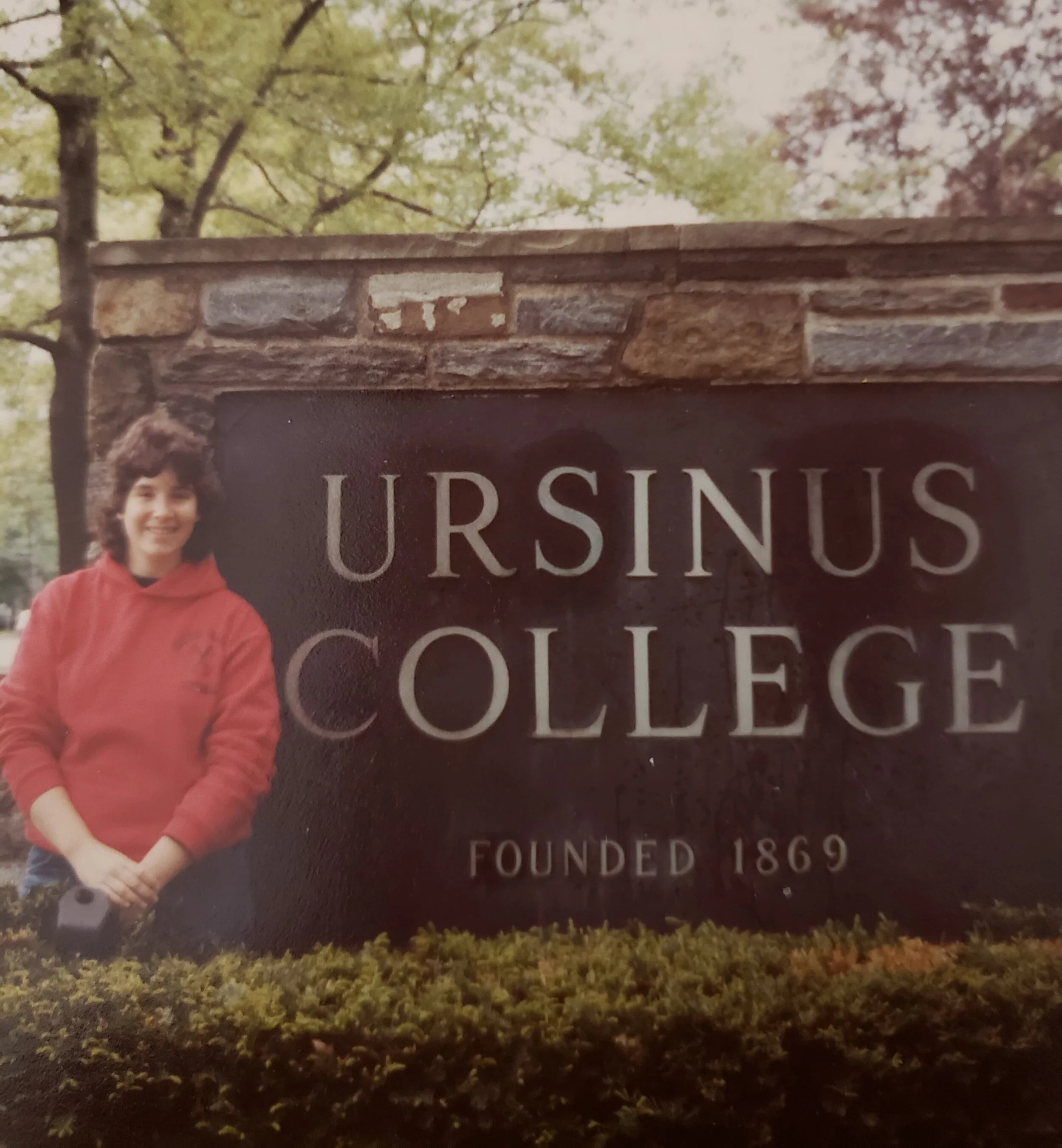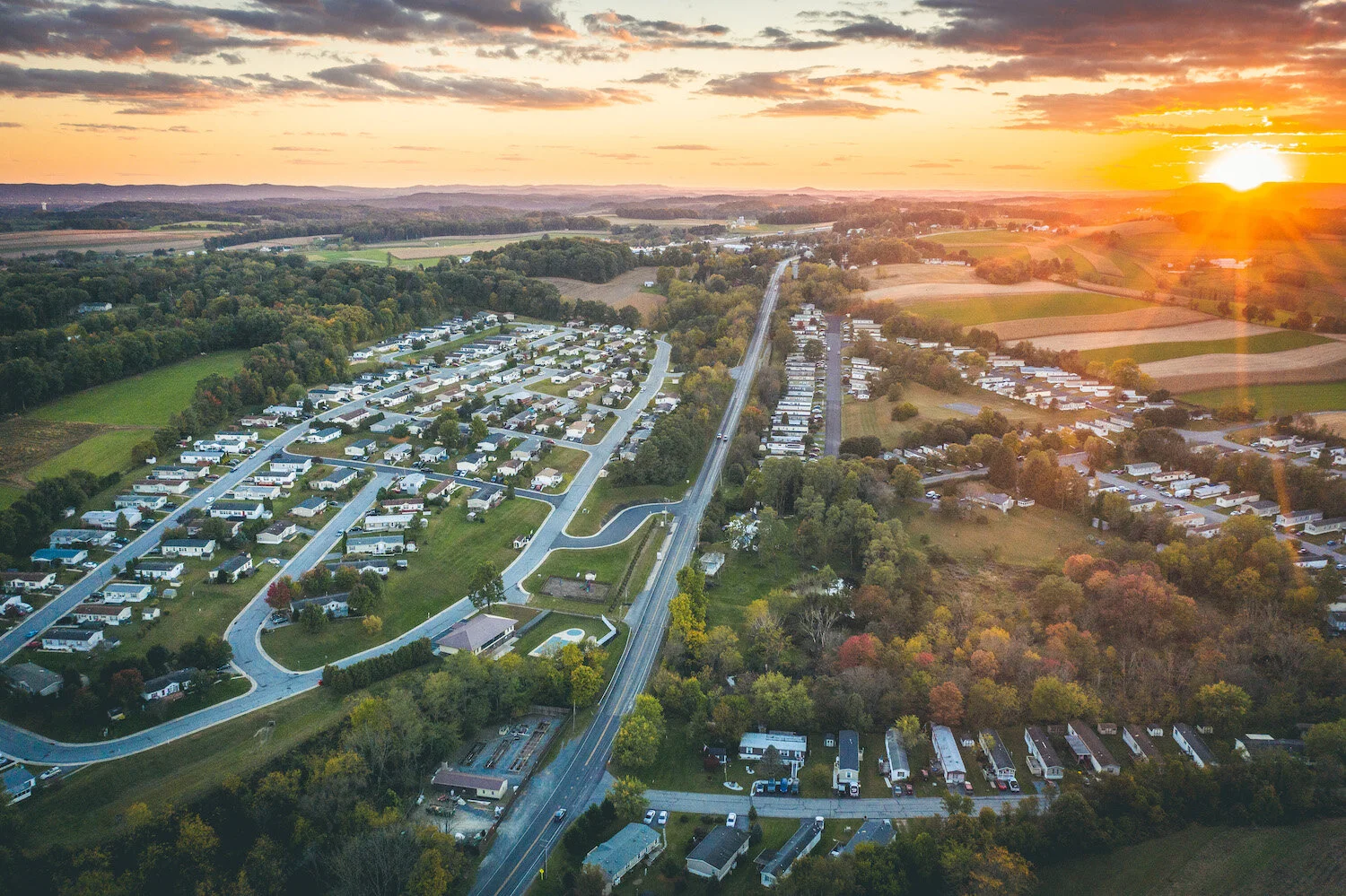Vicky’s son passed away six weeks before her and Ellen’s wedding. What does planning the “happiest day of your life” mean when it so closely trails the saddest?
Ellen + Vicky // Kutztown, Pennsylvania
Vicky had spent years looking forward to her and Ellen’s wedding day, but as she walked down the aisle, her hand looped through her brother’s arm, on the sunny afternoon of October 10th, 2020, her face creased with ache and her eyes wilted with sorrow; this moment was bitter.
Vicky walking down the aisle
Ellen had spent years rebuffing Vicky’s appeals to get married, but as she walked down the aisle, with her hand looped through her nephew’s arm, her feet bounced with energy and her eyes crinkled with joy; this moment was sweet.
Ellen walking down the aisle
Beside their arch was a small memorial set up for family and friends joining in spirit: Ellen’s grandaunt, whom she called Nana (white frame with Santa), Ellen’s aunt and uncle Ellen and Jim (silver frame in the front left), Ellen’s paternal grandparents Chuck and Lillian (gold frame in the front right), Vicky’s mother Marcia (black frame to the right of the candle), Vicky’s grandparents John and Nina (black frame in the back) and, most recently, Vicky’s son Justin (blue frame to the right.)
Vicky and Ellen’s memorial table with family members who had passed away
A few weeks before, during what was easily the most emotional conversation I’ve ever had with a couple for this project, Vicky told me, ”I think what's keeping me going right now is the positivity of us getting married, because it’ll be a very bittersweet day with my son not walking me down the aisle. After the first song or two, I plan on having a great time. But I also don't know what I'm going to be like that day.”
Vicky’s son, Justin James Carbone, passed away on August 23rd, 2020 from a drug overdose, six weeks before Vicky and Ellen’s wedding. He was 35 years old.
Vicky didn’t immediately collapse when she opened the front door that evening to a police officer. “He asked, ‘Are you Victoria?’, and I answered, ‘Yes, I am.’ He asked, ‘Do you have a son named Justin Carbone?’ I answered, ‘Yes I do.’ And then I asked, ‘Is this… is this because he's dead?’”
“After the officer left is when I lost it,” Vicky concluded.
Justin had been sober for a few months, but that evening, he’d texted a friend: “If I don’t reply to you, blow up my phone, and call the cops.” 15 minutes later, his friend blew up his phone; she called the cops; it was still too late. His last conversation was at 6:58pm. He was found dead at 7:22pm.
I write these stories to document a couple’s journey of two becoming one; to record their memories of childhood, listen to their insecurities, laugh together as we share stories and jokes. But here, I also write to grieve and memorialize the life of Vicky’s only son.
“I don’t know… how to talk about his life; how can you explain a whole life?” Vicky said with a faltered tone. “He is… he was… my boy.” I asked, then, if she could describe his personality. Who would I have met, if I'd ever gotten to meet Justin?
“He was very kind,” Ellen offered, when she saw Vicky struggling for the right words. “He had an uncanny connection with elderly people. His love for his family was strong. He carried pictures of his family with him, talked about his family, always asked about his mom, always wanted to keep in touch and know how, and what, everybody was doing.”
Justin giving a kiss to his grandmother (Vicky’s mother) a week before she passed away
Justin was gracious and caring. His connection with the elderly was particularly strong with Vicky’s mother, whom he helped take care of from 2009 to 2012. “Not many 20-somethings would want to do that, but she was so important to him,” Vicky said.
“My son…” Vicky swallowed back tears. “My son was very protective of me. And he loved me, unconditionally.”
Vicky was born in Norristown, Pennsylvania. Her parents divorced when she was two, and her memories are as broken as the home was itself. “Before I was 11 and moved to Phoenixville, Pennsylvania, I can’t remember much except for my mother and father dating on and off, him beating her in the middle of the night, a pizza flying across the room. That sort of thing.”
Vicky in middle school
Vicky often skipped school and spent little time at home. She was the youngest of her siblings, and her mother, single and raising three kids, had scant energy for formal structure. Even so, Vicky remembers her longingly. “She was the best mom I could ever ask for.” I asked if there were any values her mother instilled that she still carries today. “We were always brought up, if we have something on our mind, we speak it. We don't hold it in. Her biggest thing was truth. No matter what, you’ve always got to tell the truth.”
For decades, Vicky couldn’t reconcile the contradiction between her mother’s words and her own identity. “I had my son when I was 20,” she told me. “Those were very much my denial days. I was once asked by my sister-in-law if I was gay, and I told her ‘No,’ for the fear of losing my son. I thought, back then, that I would lose my son if they found out I was gay.”
Vicky with baby Justin
She and Justin’s father were never married, and Vicky considers herself to have been a single parent. She described the experience raising Justin. “I've worked basically since I was 14 years old, and I lived at home with my mother and my son. My grandparents watched Justin every day when I worked. They lived three blocks away, so I would drop him off in the morning and pick him up after work.”
Baby Justin with Vicky’s mother (center) and Vicky’s grandparents (left and right)
Vicky did her best to give Justin a normal life, and she put him in sports as soon as she could. “He played baseball, basketball, and football,” she said, “and it was just something in the back of my mind, that keeping him in sports would keep him out of trouble.” Justin took quickly to it; he loved sports, and Vicky told me about how he had an encyclopedic knowledge of records, dates, players, and teams.
Justin in high school
I asked if Vicky had any community or support besides her family. “I was very much closeted,” she replied, “and so I really had no community. It was pretty much a ‘don't ask, don't tell ’ kind of thing.” Vicky came out publicly when she was 34 years old, and her son was 14 years old. “I was finally comfortable with me, myself, knowing yeah, this is who I am. I can't change what I feel. A guy does nothing for me. That’s just not how this works. The good Lord, or whoever made me, created me this way. So when I finally came out and said, ‘That's it, this is who I am,’ my ex and I split up for good. Justin didn't take it very well at first, but eventually, he adjusted.”
Vicky in her younger years
Ellen’s upbringing was similar to Vicky’s, having also grown up in Pennsylvania, and in a broken home. She, too, recalled memories of abuse and arguments. “Our mother was pretty much a single mother,” Ellen said, referring to herself along with her two sisters, Tracy and Lynne. “It was difficult on my mom. Her parents died when she was 16 and 17, so her sister Ellen and brother-in-law Jim often helped, making sure we were fed and had clothes. We lived by spaghetti and the heat of the stove a lot.”
Ellen (bottom left) with her family in 1968
Ellen with her two sisters and mother
One Christmas, instead of buying presents, Ellen and her sisters picked items out from each other’s rooms and wrapped them as if they were gifts for one another. “It was actually a fun Christmas,” Tracy, her younger sister, told me, “even if we couldn’t afford anything. We were saying to each other, ‘Oh wow! I really wanted this! Thanks! ’”
Ellen in kindergarten
Ellen was born the middle child, and played the part, too. She described herself as the “black sheep” of the family, often playing basketball or going anywhere but home right up until dinnertime. She didn’t get along with her mother (“We were like oil and water”) and she teased her siblings a lot, while also being fiercely protective of them. Once, when Tracy came home crying because a boy down the street had teased her, Ellen stormed to his house and demanded he apologize. The two fought, and Ellen, unfortunately, lost.
Ellen (pink sweater) with her sisters and mother sometime in the 1980’s (“Big hair phase,” Ellen commented to me)
Her independent streak continued in college, when she dropped out after a year. "I never regretted not going back,” she told me. “I was going to teach physical education to special-ed kids, but I never would have been able to emotionally handle it. A job like that, you need to be able to go to work, and leave it at work.”
College did, however, help to solidify her identity. Like Vicky, she described herself as a “late bloomer,” and said she didn’t even know the word “lesbian” existed until she was in high school. “Back then, everybody was closeted,” Ellen said. “I had friends that I was closer to or bonded with, but I didn't realize they were gay, and then when I went to college, that's when I started realizing that, you know what, I think there's some feelings going on here.”
Ellen at college
She continued. “I was about 19 before I really realized I was gay. Before then, I’d always had this dream that I was going to have three kids, maybe five, living in this nice home, and with this man. But it was never anyone in particular. I went through a lot of relationships in my days, and I went through a period of time where I distanced myself from my family, because times were so different back then. I had to hide from my friends, family, work, everybody.”
I commented that my understanding of her situation was limited by how I didn’t live through much, if any, of the experiences she had, personally or historically. Ellen let out a sigh of disbelief and commented to Vicky, “That’s right, he didn’t even live through the AIDS epidemic!” I nodded; I’ve learned by reading books, while she and Vicky have learned by living life.
Ellen’s high school senior photo
“It was horrible,” Ellen continued, “people treating them like they were lepers, visiting a friend in SF once and then him being gone a few months later. I once worked at a doctor’s office, and there was a patient who came in and had AIDS, and no one would want to talk to him or help him. Instead, they put him in a room and would only go in there with a lot of Lysol and disinfectant spray. I’d just think to myself, ‘What is wrong with you people?’”
Aside from her close friends, Ellen didn’t tell anyone about her identity. “It was very scary. You were afraid of people finding out because then you wouldn't be accepted. You wouldn't get a job. You wouldn't be promoted. You had to hide yourself. It was just this fear.” Her mother found out through someone she was dating. “I was in a very, very bad and abusive relationship,” Ellen shared, “And I was threatened that if I left, she was going to call my mother and tell her about who I was.”
“Well, this is the best coming out story ever, because I told that ex I was leaving and couldn’t stay any longer.” Ellen’s ex had grabbed the phone to call Emma and out Ellen. In a panic, Ellen grabbed another one of the phones downstairs—these were the days of connected landline phones—and shouted for her mom to just hang up. “Emma, there's something you need to know about your daughter,” Ellen’s ex began.
“And after all these years of fear…” Ellen smiled, and sighed. “I heard my mom say, ‘Before you start, I just think you need to know one thing. There's nothing you can tell me about my daughter that I don't already know. And I love her anyway. Now what do you have to say to me?’”
Vicky and Ellen with Emma
Before Justin’s passing, Ellen told me that there were a few things she and Vicky thought might make their story unique: their age (both are 55), their identity (being gay in a time when it was far less accepted than it is now), and the fact that Emma lives with them.
“My mother and I fought like cats and dogs for years,” Ellen told me. “My mom used to take turns being mad at me or my sister Tracy. She would have to be mad at somebody for something.” We had this conversation while eating dinner one evening. Ellen turned to her mother, who sat beside her at the table. “Right, mom?” Emma thought about it, and replied, somewhat innocently, “I don’t remember.” Ellen laughed. “I guess that’s the good thing with dementia. I think you’re choosing to forget.”
Ellen, Vicky, and Emma having dinner at home one evening
Emma moved in with Ellen and Vicky in October of 2019. Her dementia, along with other health issues—arthritis, neuropathy, and a previously broken shoulder—had progressed to the point where she was struggling to care for herself. After many months of discussion, Ellen and Vicky decided that it would be best for them to find a larger home, and to have Emma live with them.
The decision did not come lightly. A decade earlier, when Vicky’s mother was diagnosed with lung cancer, Vicky had devoted most of her time and energy to taking care of her. “Taking care of my mom was the hardest thing I've ever done in my life, but it was the best thing,” Vicky told me. “She was my best friend, my number one advocate. She would stand behind me, no matter what I chose to do. When I told her ‘I'm gay,’ she just said, ‘Okay, you're gay. So what?' It was that kind of relationship. And I said I would never take care of another person, because of how much taking care of my mom meant to me.”
Vicky’s mother, Marcia
Vicky’s promise to never take care of anyone else again extended even to her father, who passed away a few years after her mother passed. “I tell Ellen all the time,” Vicky said, “you don't realize how lucky you are to have both your parents, because now I've lost both my parents, and my son.”
Vicky with her father
Ellen, who works for the US Postal Service, was still a few years away from retirement, and if Emma were to come live with them, most of the daily caretaking responsibilities would ultimately fall on Vicky. Ellen was well aware of Vicky’s conviction to never take care of someone again, and thus hesitated to push the subject too hard. But, after many months of discussion, Vicky agreed; Ellen would continue working during the day, and Vicky would take care of Emma at home.
I asked Vicky how she ultimately decided to agree to care for Emma. She replied without hesitation. “I love Ellen enough. I fell in love with Ellen enough that I knew that I could help her take care of her mom.”
Vicky and Ellen after the ceremony
The weight of Vicky’s changing mind wasn’t lost on Ellen. “I didn’t want to get married,” Ellen said, “because I thought there was no reason to get married; we already loved each other and lived together. But, after Vicky said she’d take care of my mom, I literally was driving to work one day, and I started crying, thinking, ‘What am I doing?’ I actually texted our best friend and I said, ‘I think it's time.' And she thought I meant breaking up, but I said, ‘No, it's time to put a ring on it.’”
Ellen and Vicky met on Facebook in 2013 through a dog rescue group. “Vicky had all these posts on this group,” Ellen told me, “So I friended her, and sent her a message saying ‘Look, I’m the postmaster for the area, so if you want to send me a picture of the dogs, I can post it and have the mail carriers look out for it.’ And she blew me off for a while, but we eventually started texting back and forth.”
The two shared a fun rivalry: Ellen worked for the USPS, while Vicky worked for FedEx. Vicky continued the story. “I was on FedEx First Overnights, so I was out doing deliveries at seven o'clock in the morning. And one day, I was done at 7:45 and had 15 minutes to spare before I had to get back to the station. So I texted Ellen, and asked if she was nearby and if she wanted to meet.” Ellen agreed, and the two exchanged a quick conversation before returning to their jobs. Vicky texted Ellen a few hours later, this time to go for lunch. “We went over to Olive Garden,” Ellen said, “And we sat there for lunch for an hour and a half, went to the parking lot to leave, and next thing you know, it was like four or five o'clock at night.”
Ellen had recently left a relationship, and was resolved to stay single for a bit. “I had a brick wall up,” Ellen said. “I told myself, I am going on at least a year completely single. And then Vicky came along and ended that.”
Ellen and Vicky’s first picture together, from 2013
“I broke her wall, little by little,” Vicky said, “and it probably hasn’t even been two years since it’s all come down.” The early years of their relationship were spent learning to communicate and live with one another. “The beginning of our relationship was actually rockier than it has been in the past few years,” Ellen said, “because Vicky just had a temper. A lot of my brick wall was because of abandonment issues from previous relationships, and so when Vicky would fly out of the house, tires screeching, I saw that as her abandoning me, and just thought, ‘Oh this is not going to work.’”
Vicky asserted her intention was never to make Ellen feel abandoned. “Instead of confrontation, I’d just rather walk away from it,” she explained. “And that's what I did; I got in my car, and I went for a ride. To her, that was disrespect and abandonment, but to me, it was just not wanting to say something that might come out wrong or hurtful, when you didn’t really want that.”
Both described the eventual change as something that just “clicked.” “We don’t really argue anymore,” Ellen said, “and when we do, it’s just about the stupidest things, the kind where you think about it the next day and just shake your head, like, really?”
Vicky and Ellen in 2015
As they learned to communicate with one another, they also learned to be in pain and to heal; between the two of them, they’ve had over a dozen major surgeries in half as many years, on their hands, shoulders, hip, neck, thyroid, bicep, and back. Vicky slipped on black ice one day working for FedEx in 2015, and has been unable to work since, while Ellen was nearly paralyzed for a period of time because of back issues. “She’s seen me at my absolute worst,” Ellen told me, “and she stood right by me and never even flinched. I think that’s what helped with my abandonment issues, and a lot of the wall I had up.”
Even without her wall, for most of her life, Ellen never imagined marriage would be a part of her own story. “Before 2015, I just never thought it would be legal in my lifetime,” she told me, “and I got to the point in my life where I’d say the Pledge of Allegiance, and I couldn’t say ‘and liberty and justice for all’ because it wasn't true.” She cried at work the day in summer of 2015 when the Supreme Court came out with a 5-4 ruling in Obergefell v. Hodges that same-sex couples had the right to marry, and have their union be recognized in every state. “The email came out, and I had to stand up and shut my door. I was crying like a little baby, because it wasn’t just that it was legalized; it was also that they gave us all our benefits too, as federal employees.”
The last brick in Ellen’s wall fell when Vicky agreed to take care of her mother at home. “It completely changed her life,” Ellen told me, “because she became my mom’s main caretaker. She’s so dedicated, and I’m so thankful for her.”
Ellen and Vicky in 2018
Ellen began thinking of a surprise proposal, which Vicky then nearly ruined. “A few days before I was going to propose, Vicky asked, ‘Why are you so dead set against marriage?’ And I'm sitting there going, ‘Oh no, please don’t ask that right now.’” Vicky laughed as Ellen told the story, adding, “I got to the point where I told Ellen, I’ll even take a sapphire; I don't need a diamond.”
Ellen replied with her old answer: they loved one another, they were living together, and they already knew they were going to spend the rest of their lives together. What was the point of making it formal? Unlike previous times, though, she was lying.
Vicky’s ring
Ellen and Vicky own a small camper home in the Pennsylvania woods, where they enjoy visiting on the weekends to relax and escape from the rest of the world. Some of their other friends have the same setup, and they often coordinate trips so they can hang out together. Many of Ellen and Vicky’s best memories have been made in those remote woods, and so Ellen thought them to be perfect for the proposal.
The date was July 28th, 2019. “While I kept Vicky busy and distracted her,” Ellen said, “Robin, my maid of honor, put out this big pile of wood in the fire pit and laid some flowers on it. When Vicky first saw it, she thought it was a memorial for someone, and was telling us not to get too close or disturb it.” Ellen had to say it outright. “I told Vicky, ‘No, the flowers are for you,’ and she was completely shocked and confused. So I walked up, got down on one knee and said, ‘You know how the other day you asked me why I’m so dead set against marrying you? Well, I'm not dead set against it.’” Ellen pulled the ring out, and asked Vicky to marry her. “I was in complete disbelief,” Vicky said, laughing as she recalled her shock.
Vicky and Ellen after the surprise proposal
Ellen and Vicky live in a small rural hilltop community in Pennsylvania, within one of the ebbs of the state’s periodic stretches of mountains and valleys. Farmland covers much of the area surrounding them and, occasionally, they experience traffic jams caused by the slower-moving horse and buggies of the local Amish population. It was a beautiful drive through Pennsylvania to get to their home.
A drone photo above Vicky and Ellen’s neighborhood in Pennsylvania
Among my greatest learnings while living with couples for this project is the importance of knowing when to speak and when to stay silent. Speaking usually feels like the easier choice; my natural tendency is to fill empty or awkward space with my own voice. But silence, I’ve learned, is often more appropriate. The measure of a deep friendship is not in how much can be communicated through conversation, but how much can be communicated through silence; pangs of longing on wrinkled lips; flashes of remembrance in one’s eyes; sighs. Many, many sighs.
Vicky points out when Emma forgets to change her clothes from the day before. She washes the dishes if Ellen makes dinner. She reminds Emma to take her medicine, and helps rewrap bandages throughout the day. She offers a gentle, brushing hand to the many animals around the house: four cats, two birds, two bearded dragons, and a dog. She sits on the couch, scrolling through Facebook, as daytime TV quietly plays in the background. She sighs, often.
Vicky petting one of the bearded dragons
Most of my conversations at home with Vicky were logistical. “Do you have everything you need?” she asked me one evening before I started cooking dinner. Another morning, I smirked to her as I trotted out of the guest bedroom, and said, “the birds were really loud this morning.” She softly chuckled back.
Occasionally, we’d talk about the present. “I’m a zombie right now,” Vicky told me one evening. “I'm not… this is not my normal. I'm not… me. I’m trying to find me again.”
Ellen and Vicky had just begun final wedding planning when Justin passed away. “We started to finally get things rolling in August,” Ellen told me, “and then everything ground to a halt.” I remembered being at a complete loss when I received the Facebook message from Ellen. “Wedding is still on… however, Vicky lost her son. He battled with drug addiction for many years. And yes… we want to include that in our story. Who knows? Maybe it can help someone.”
The time since Justin’s death has been a blur for Ellen and an unyielding fog for Vicky. They shared about signs they’d seen of Justin’s spirit. A few days after the funeral, in the middle of the night, as Ellen sat on the couch finishing up some work, she heard crying coming from the bedroom, where Vicky was already asleep. "Vicky, honey, come here,” Ellen said. The bawling continued. “C’mon Vicky, come to me.” Still no response. The crying continued. “Ok, hold on. I’ll come over there to you.”
When Ellen looked into the dark bedroom, she didn’t hear anything; figuring Vicky went out for a smoke, she checked the back door. It was locked. She went back to the bedroom, and touched Vicky on the shoulder; she was in the bed, fast asleep. “And I just was so upset. Because I realized: that was Justin. His cries were clear as a bell, they were so clear.” Vicky added, “He was crying because he was sorry.”
Justin’s urn in Ellen and Vicky’s living room
Vicky’s grandparents were at the core of Justin’s life, helping to raise him while Vicky worked. Her grandfather’s passing marked the beginning of Justin’s battle with addiction. “Justin was always looking for love,” Vicky said, “but what he found wasn’t love. It was drug-induced. The best way I can describe his struggle is that he just constantly kept falling and picking himself up again.”
“I noticed a pattern,” Ellen told me, “where he’d be clean for a long period of time, and then he’d use for a short time. He’d always call Vicky. He’d say, ‘Mom… I fucked up.’ And she’d make sure she got the help he needed.” Justin always knew when he needed to check into rehab, and Vicky always helped him with the process.
He also always remained a caring person. “He could be at his worst,” Vicky said, “And he'd still be asking how Ellen or her mom was doing. His love for his family was very strong.” Justin never stole from Vicky, and never did anything to directly harm his family. “But I enabled him for a while,” Vicky admitted. “Not monetarily, but I let him live in a house. I promised my mom that he’d always have a place to live, so I paid the bills.”
Justin
Eventually, in 2017, after countless cycles of rehab and relapse, things escalated beyond what Vicky could handle. “He overdosed, and it was bad,” Vicky told me. “It was very bad. He was on a ventilator, in a coma. And I threw him out of the house after that, because I had had enough. It was time for him to see what life is really about, and to get his life together.”
After throwing Justin out, Vicky experienced a mental shift: she understood the possibility of one day getting that call or knock on the door. Ellen understood it, too. “That's the day that I had to put on a complete, total wall up with him,” Ellen told me. “Because I knew if we were going to get that phone call, I had to be there for Vicky.” She sighed. “He still managed to break it, though.”
Ellen recalled telling Justin that she wanted to marry Vicky. “I called him, and I said, ‘Justin, I have a question for you: will you be my stepson?’ And he was so excited. He was just so excited.” Vicky recalled his humor. “He just always had a smirk on his face. He was sneaky, and he liked to pull pranks on people and make them smile.”
Lisa, one of Vicky’s closest friends, recalled some of her own memories with Justin. “We joked a lot, because life is not always about the bad. You have to find humor sometimes. And with Justin, I could do that.” She shared an illustrative story. “Once, I was driving down the street to visit Vicky, and I saw Justin walking home, so I rolled down my windows and just said, jokingly, ‘Hey… do you… want a ride?’ When we were only, like, four or five houses away. And he just gave this big grin and smile and started walking faster instead, and I just laughed. Because that’s just what we’d do, is joke around.”
She continued. “But, I could also just go over there and beat his ass. Because you feel the struggle. You feel the pain. You feel the anger. Vicky was fighting so hard with him and his drug addiction. I’d want to slap the hell out of him. Tell him, ‘Wake up! '" Vicky told me about the one time she got physical with her son. “There was a time that I decked him. He’d taken Xanax, and I knew because he became the stupidest person on the earth. He fell out of the dumb-dumb tree, hit every branch along the way, and the ground. And I clocked him so hard. From that day on…” Vicky let out a deep sigh, clearly conflicted. “I swore I would never beat him up for his addiction. That I would just be the most understanding parent that I could be without enabling him.”
Justin had been trying to turn his life around; he was working hard, 14 hours a day, and talking excitedly with his friends about finally getting his own apartment. But no one, of course, knows what he was thinking about before he passed. His autopsy showed cocaine, meth, and fentanyl in his bloodstream; he’d likely overdosed thinking he was doing heroin, when it’d been cut with fentanyl.
Vicky hesitated when she talked about change; she spoke in one moment with certainty, the next without, her mind clearly caught between feuding instincts. “If there was anything I could probably change…” she started. “I don't even know where I would begin to change. I guess that I wouldn't change a thing…. well, I would change things if I could, but… I wouldn't change my life.”
Vicky with Justin
“Addiction is addiction,” she eventually said. “And if there's ever somebody that needs help… I’d certainly want to be the first one to give them a helping hand. I lost a piece of my soul. But I’m getting better. I see signs that he’s around, and know that he’s around me. His life ending has not defined who I am. I’m able to tell stories about him now.”
“He was my first real love… he’s always been my first love.”
Grief, in the moment, is difficult, maybe impossible, to fully share. No one can understand what being Justin’s mother was like, can be reminded of his birth, his first words, the times he got hurt, the dreams he had, the arguments they shared.
Vicky spoke through tears. “His ashes are right behind us, and he's here with us. I know I’m going to be okay. I see it every day. I get a little bit stronger. I can actually sit here and talk about him.”
“As of right now, I’m okay with him being gone. I miss my son. But his battle is over. He doesn't have to fight anymore. There's no more demons to beat him up. The loneliness is gone. Because now, he's up there with my mom.”
One evening, as Ellen, Vicky and I talked through wedding logistics, Vicky suddenly mentioned, “I just can't wait to see if Justin and my mom show up. Because you know, it's the butterflies.” She paused, and smiled. “I’m sure she will.” Butterflies, I learned, are commonly seen as a sign of the presence of those who have passed, communicating between worlds, circling loved ones, the hypnotic flitting of their kaleidoscopic wings lending reassurance, hope, and closure to those still grieving.
“We were both born Catholic,” Ellen said, “and we consider ourselves more spiritual than religious. But if God gives you so many signs, and you still don’t listen…” She shook her head. “Shame on you.”
Ellen and Vicky’s wedding was hosted by Vicky’s brother John and his wife Stacey in their beautiful backyard in rural Pennsylvania. Pre-COVID, their plans had been to invite 140 guests to a celebration at a riverfront venue, but when those fell through due to the pandemic, Stacey and John worked tirelessly to decorate their backyard so it’d be fit for the wedding Ellen and Vicky deserved.
The day before, I helped roll out tables and set up chairs when Vicky and Ellen’s backs wouldn’t permit such strain. Throughout, I overheard Ellen saying to her friends, “I can’t believe I’m about to be a wife!” (This continued on the wedding day; shortly after the ceremony, Ellen couldn’t seem to stop saying, “Oh my God, I’m a WIFE!” And, pointing to Vicky, “Have you met my WIFE?”)
Chairs set out for Ellen and Vicky’s wedding ceremony
Aside from their DJ and myself as their photographer, Ellen and Vicky’s wedding vendors were their family, which was particularly meaningful for Ellen. Ellen always loved and wanted to have kids, but it never happened. “I said that if I didn’t have kids by 35, I wouldn’t have kids. And on my 35th birthday, I cried all day.” When her sisters had kids, Ellen treated them as her own.
“Watching them grow, and being such a big part of their lives, has been the biggest blessing I’ve had,” she told me. “When someone asks what I do for a living, I usually say ‘I’m an aunt to 5 amazing kids.’”
Ellen’s niece Rebecca helped Emma do her makeup and sang Grow Old with Me by John Lennon as Ellen walked down the aisle; Ellen’s younger sister, Tracy, assembled a beautiful charcuterie board; and Vicky’s niece and grandniece acted as their flower girl and ring bearer.

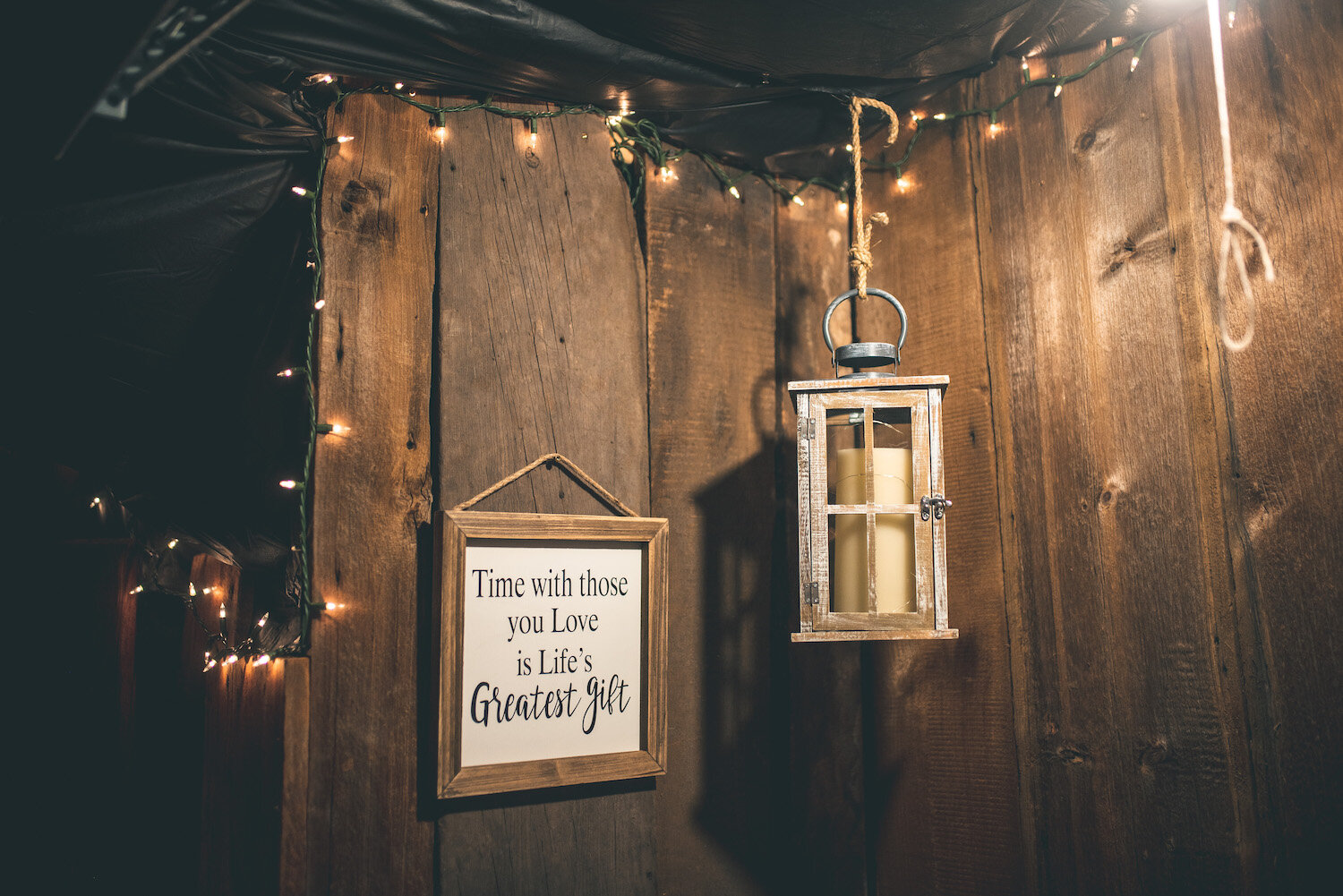
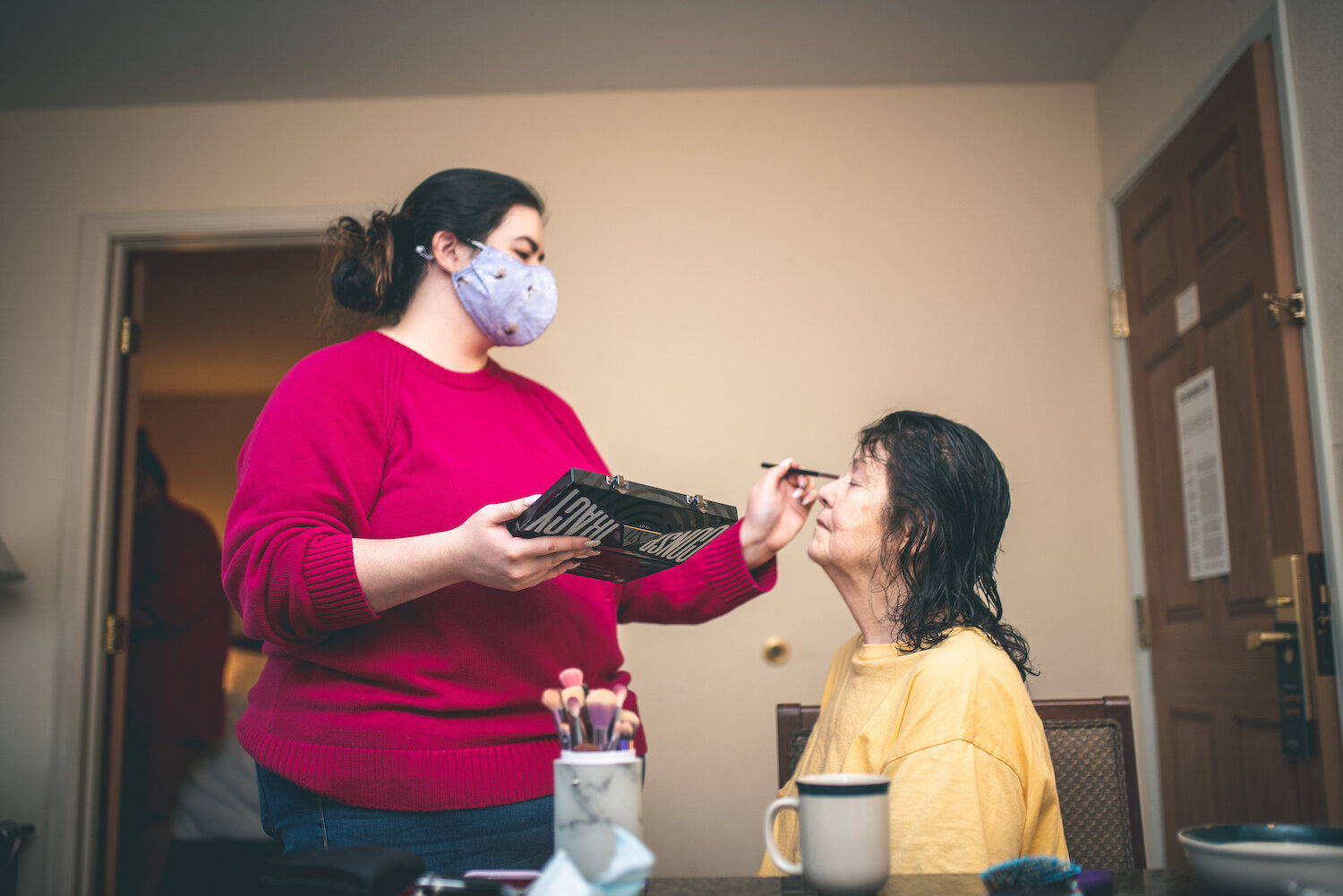

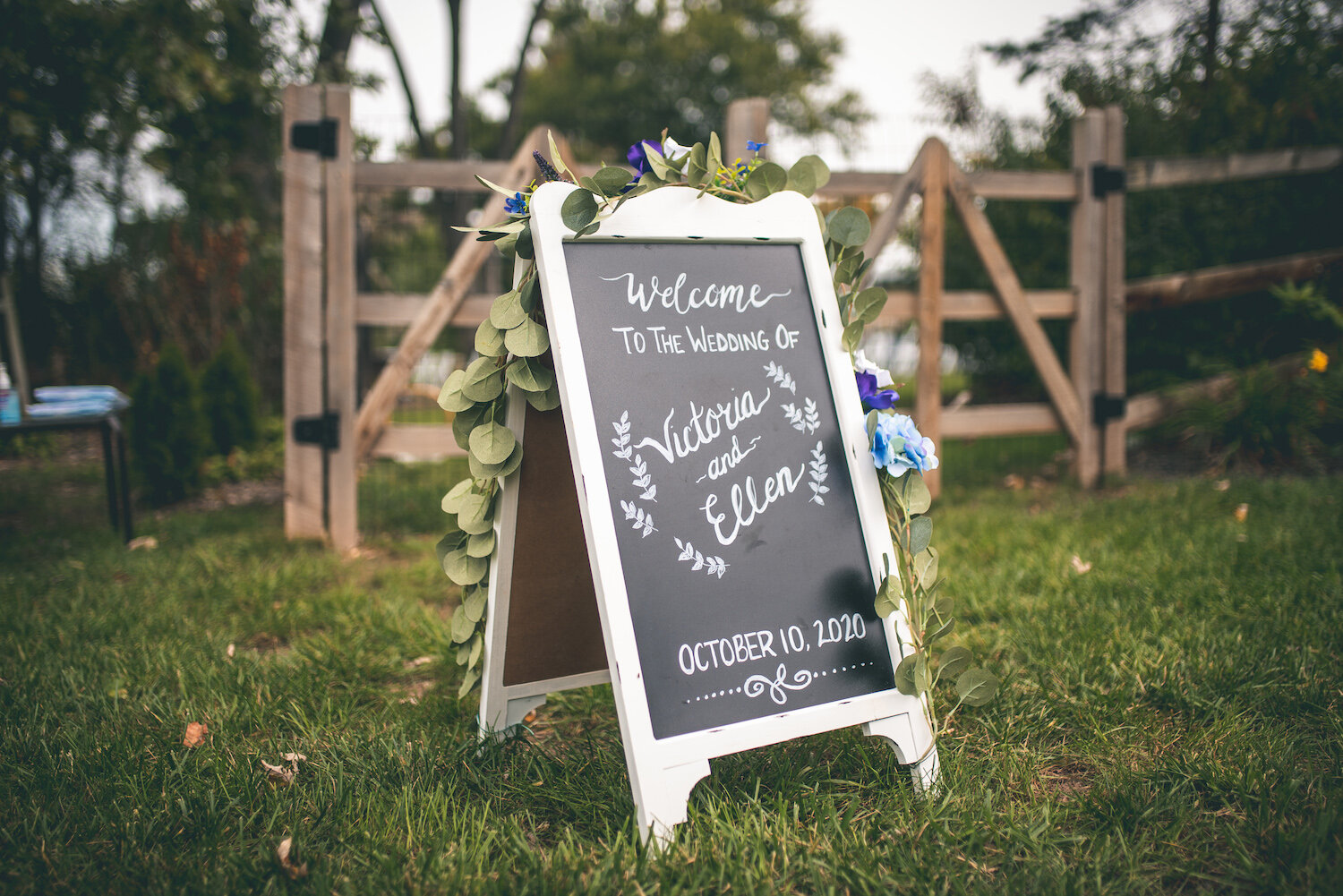

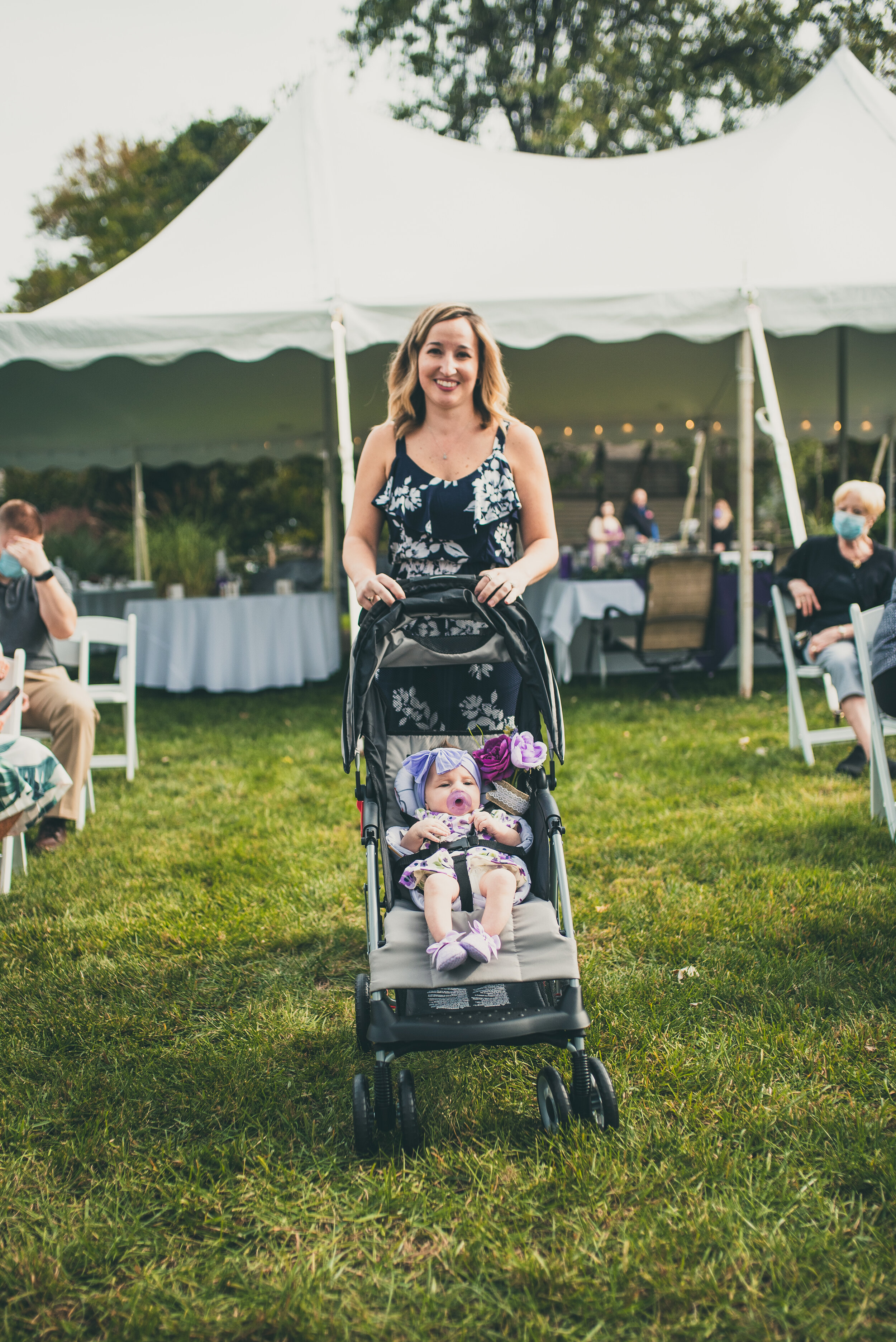
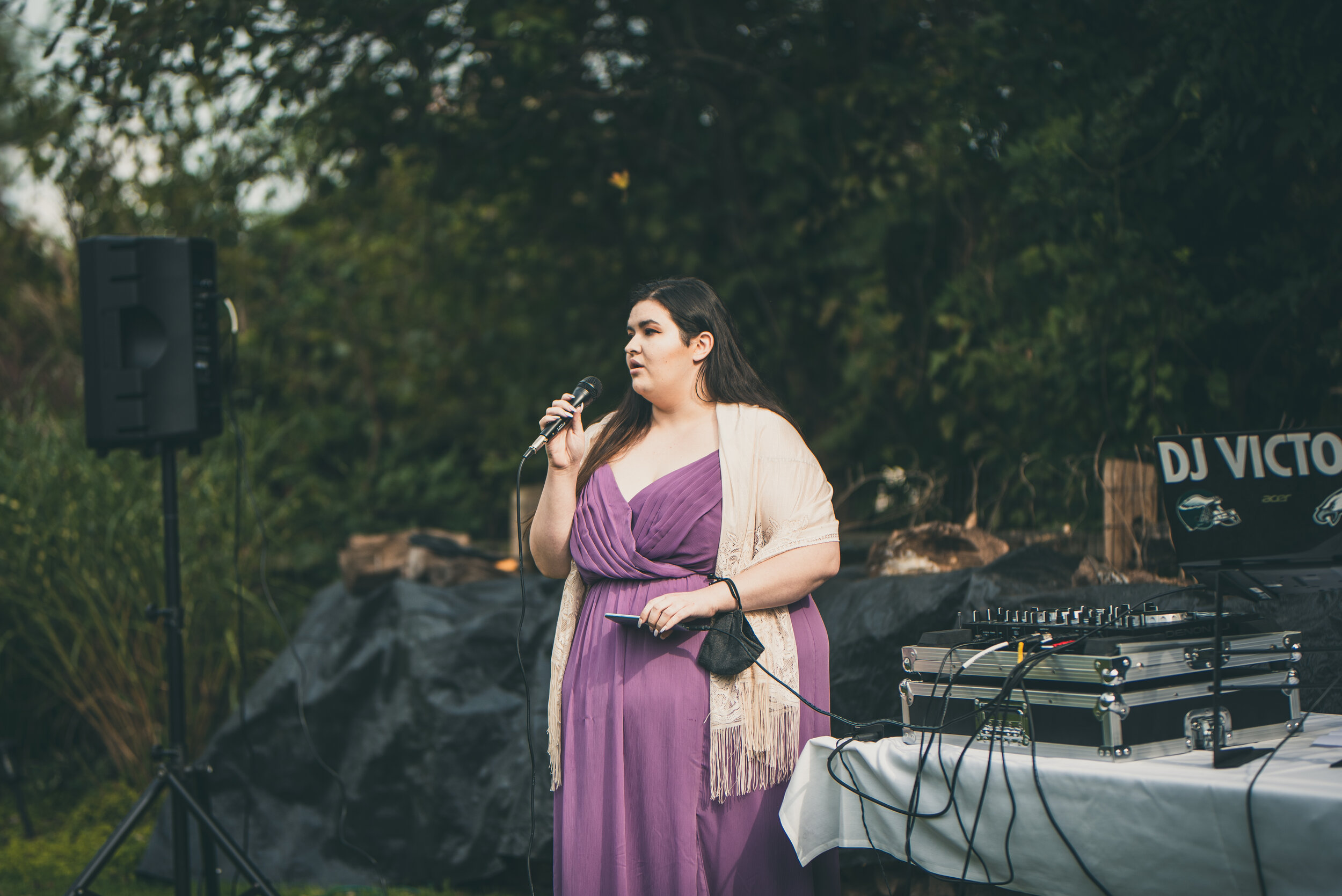
The “Young” in Portrait of a Young Couple isn’t about age, but spirit, and the optimism that envelopes two people committing their lives to one another; most of Ellen and Vicky’s wedding was little different from that a couple of a younger generation might’ve planned.
But, in a few endearing ways, I did see contrasts. They served coffee alongside the food for those getting a bit too tired; Ellen commented that the DJ better play smooth jazz so the old people can “dance like this,” swinging her arms and hips while keeping her feet firmly planted on the ground; when the wedding classic Cha Cha Slide came on, and DJ Casper shouted “Criss Cross!” Ellen simply shook her head and fingers and shouted “Nope!”
In honor of Justin, Ellen and Vicky chose their first dance to be to Cole Swindell’s You Should Be Here, whose lyrics cry out:
It's perfect outside, like God let me dial up the weather
Got the whole crew here, I ain't seen some of them in forever
It's one of those never forget it, better stop and take it in kinda scenes
Everything's just right, except for one thing
You should be here, standing with your arm around me here
Cutting up, cracking a cold beer
Saying cheers, hey y'all it's sure been a good year
It's one of those moments, that's got your name written all over it
And you know that if I had just one wish
It'd be that you didn't have to miss this
You should be here
Vicky buried herself in Ellen’s embrace. As they danced, someone suddenly pointed to the space around them; a dragonfly had flown over, and glided around the different tables before circling Ellen and Vicky.
Vicky and Ellen embracing during their first dance
When the song ended, everyone looked around, unsure if they dared draw the same conclusion. Vicky spoke for everyone. “That was Justin,” she cried out, her cheeks glossy from freshly wiped tears. A small smile broke across her face. “He’s here.”















